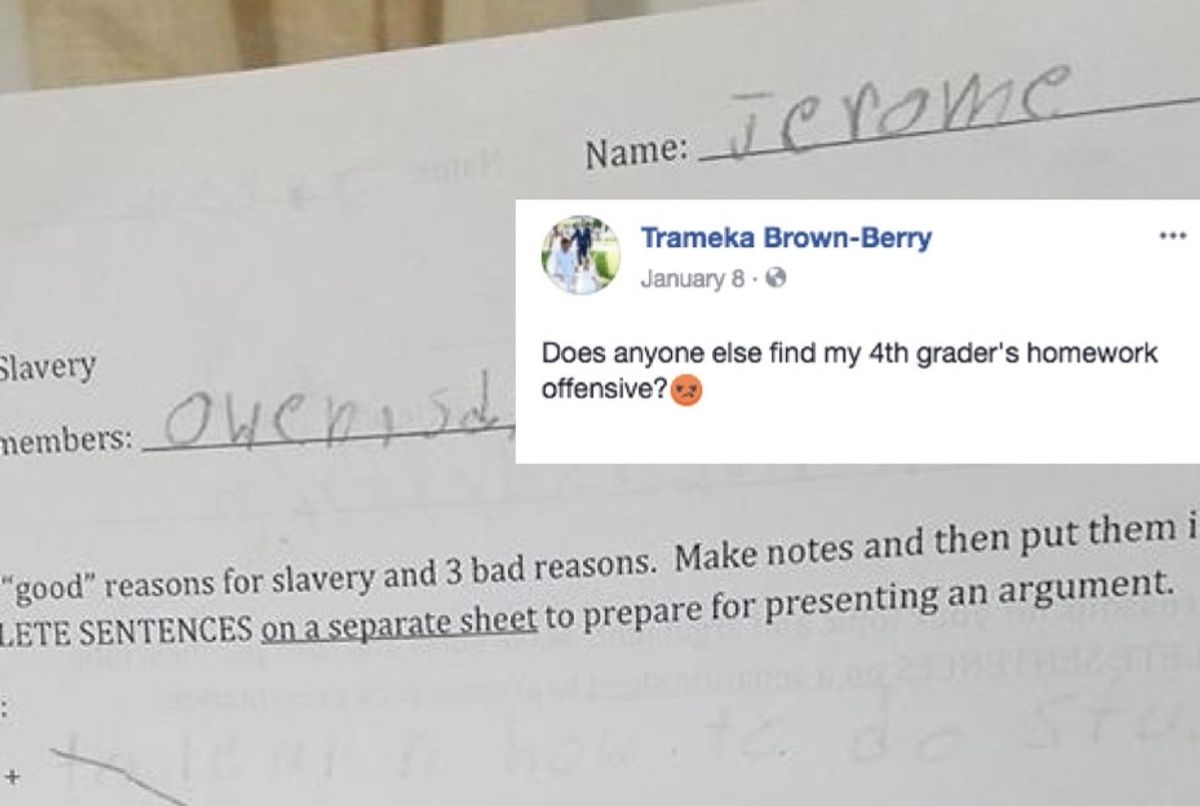A school assignment asked for 3 benefits of slavery. This kid gave the only good answer.
The school assignment was intended to spark debate and discussion — but isn't that part of the problem?

A school assignment asked for 3 "good" reasons for slavery.
It's not uncommon for parents to puzzle over their kids' homework. Sometimes, it's just been too long since they've done long division for them to be of any help. Or teaching methods have just changed too dramatically since they were in school. And other times, kids bring home something truly inexplicable.
Trameka Brown-Berry was looking over her 4th-grade son Jerome's homework when her jaw hit the floor.
"Give 3 'good' reasons for slavery and 3 bad reasons," the prompt began.
You read that right. Good reasons ... FOR SLAVERY.
Lest anyone think there's no way a school would actually give an assignment like this, Brown-Berry posted photo proof to Facebook.
In the section reserved for "good reasons," (again, for slavery), Jerome wrote, "I feel there is no good reason for slavery thats why I did not write."
Yep. That about covers it.
The school assignment was intended to spark debate and discussion — but isn't that part of the problem?
The assignment was real. In the year 2018. Unbelievable.
The shockingly offensive assignment deserved to be thrown in the trash. But young Jerome dutifully filled it out anyway.
His response was pretty much perfect.
We're a country founded on freedom of speech and debating ideas, which often leads us into situations where "both sides" are represented. But it can only go so far.
There's no meaningful dialogue to be had about the perceived merits of stripping human beings of their basic living rights. No one is required to make an effort to "understand the other side," when the other side is bigoted and hateful.
In a follow-up post, Brown-Berry writes that the school has since apologized for the assignment and committed to offering better diversity and sensitivity training for its teachers.
But what's done is done, and the incident illuminates the remarkable racial inequalities that still exist in our country. After all, Brown-Berry told the Chicago Tribune, "You wouldn't ask someone to list three good reasons for rape or three good reasons for the Holocaust."
At the very end of the assignment, Jerome brought it home with a bang: "I am proud to be black because we are strong and brave ... "
Good for Jerome for shutting down the thoughtless assignment with strength and amazing eloquence.
This article originally appeared seven years ago.
- A teacher had her 8th graders write 'funny' captions under slavery-era photos. Seriously, WTF. ›
- Classroom slide listing pros and cons of slavery is horrific - Upworthy ›
- Voice recordings of people who were enslaved offer incredible first-person accounts of U.S. history - Upworthy ›
- 'Drapetomania' was coined to explain why slaves ran away - Upworthy ›
- Woman's antique turned away from 'Antique Roadshow' - Upworthy ›
- The true forgotten history of the Underground Railroad to Mexico - Upworthy ›
- Woman's rare antique turned away by Antique Roadshow for gut-wrenching reason - Upworthy ›





 The first deposit of orange peels in 1996.
The first deposit of orange peels in 1996. The site of the orange peel deposit (L) and adjacent pastureland (R).
The site of the orange peel deposit (L) and adjacent pastureland (R). Lab technician Erik Schilling explores the newly overgrown orange peel plot.
Lab technician Erik Schilling explores the newly overgrown orange peel plot. The site after a deposit of orange peels in 1998.
The site after a deposit of orange peels in 1998. The sign after clearing away the vines.
The sign after clearing away the vines. Prokop Vejdělek, at age 22 and 101
Prokop Vejdělek, at age 22 and 101










 gym GIF
gym GIF One of the predecessors of modern gym equipment
One of the predecessors of modern gym equipment Bicep curls, anyone?
Bicep curls, anyone? Precursor to the stationary bike?
Precursor to the stationary bike? Something like horseback riding?
Something like horseback riding? Clearly isolating the foot and/or leg. For what, though?
Clearly isolating the foot and/or leg. For what, though? What does this machine even do?
What does this machine even do? Women also demonstrated Dr. Zander's exercise machinery.
Women also demonstrated Dr. Zander's exercise machinery. Do we even want to know what this machine does?
Do we even want to know what this machine does? Couple lounging on the hood of a car.
Photo by
Couple lounging on the hood of a car.
Photo by  Woman wearing black sweater holding hand with man wearing gray suit jacket.
Photo by
Woman wearing black sweater holding hand with man wearing gray suit jacket.
Photo by